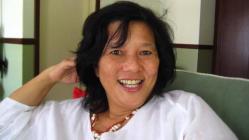Islamic Feminist Activist Says Change Needed
Zainah Anwar’s great grandfather, an Islamic scholar who divided his
time between Saudi Arabia and Malaysia, married an Abyssinian slave
girl he bought in Mecca.
Her grandfather had a total of seven wives (not all at the same time).
She
says her mother waited on her father hand and foot, and her brother
never did a lick of housework – not the kind of family history one
might expect to produce an Islamic feminist activist.
Or perhaps it is. Amazing women flourish in all kinds of interesting environements.
One
thing is certain, Anwar has strong views on how Muslim women should be
treated in the context of Muslim communities, and the religion that
dictates how they function.
 The
way she sees it, things must change significantly to address a whole
slew of issues (such as polygamy, domestic violence and freedom of
expression), that she believes create inequalities between men and
women in Islam. Her views (shared with me today in a half hour
conversation in Kuala Lumpur), and which may Muslims might find
controversial, don’t endear her to some of the Islamic powers that be.
The
way she sees it, things must change significantly to address a whole
slew of issues (such as polygamy, domestic violence and freedom of
expression), that she believes create inequalities between men and
women in Islam. Her views (shared with me today in a half hour
conversation in Kuala Lumpur), and which may Muslims might find
controversial, don’t endear her to some of the Islamic powers that be.
But that doesn’t phase her in the least.
“This
work is not for the fainthearted,” she says. “If you can’t handle
controversy and you get depressed because people are attacking you,
then you can’t do this kind of work. You must expect to be attacked, to
be criticized, and to be called anti-God and anti-Islam.”
She says it’s natural for men to resist the kinds of changes she feels are required.
“Men
have been privileged for thousands of years,” she says. “Why would they
want to lose that privilege without a fight? Using religion to sanctify
that privilege is a powerful tool in a society where religion matters.”
Sisters in Islam
A
native Malaysian, and a Muslim of course, Anwar worked as researcher
and journalist in her twenties and early thirties before becoming a
mostly full-time feminist and human rights activist in an Islamic
context.
She is one of eight founding members of Sisters in
Islam, a Malaysia-based organization dedicated to studying women’s
rights in Islam, and to stopping the use of Islam to discriminate
against women.
The group started meeting in 1987, and became a
public voice in a letter to the editor in 1990. Supported by funding
from around the world, Sisters in Islam has since become a significant voice for Muslim women in Malaysia.
It
provides services such as public education and training in women’s
rights in Islam. It has a research unit that is currently conducting a
four-year study, including a major national survey, on polygamy and the
family, and provides support and advice with respect to legal issues to
700 – 800 women each year.
Musawah: For Justice and Equality
Anwar recently retired as Executive Director of Sisters in Islam, and is spearheading a new project called Musawah,
which began with an idea to bring together women’s groups in Muslim
countries, and seems to be turning into an international movement for
justice and equality in Muslim families.
Just last month,
Musawah welcomed more than 200 women from 47 countries at its first
five-day international conference in Kuala Lumpur. If the media coverage
is anything to go by, the event was a major success. (Some of the
articles are shocking, others are fascinating. Either way, they are
surely worth a look.)
The goal of the conference was to bring
Muslim women together to develop an international voice to resist the
potential return to more conservative laws and policies in some Muslim
countries, and to generate some momentum for more law reform
internationally.
According to Anwar, the tremendous energy,
optimism, spirit, and response generated by the conference is testament
to the fact that re-evaluating the nature of women’s rights in Islam is
an idea whose time has come.
Being a non-Muslim, it's not my place to comment on these things. But I wonder what other Muslim women think...?
Click on the play bar to hear the thought-provoking 30-minute interview.
{mp3}Zaina Anwar{/mp3}